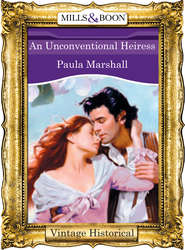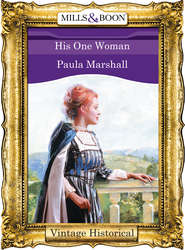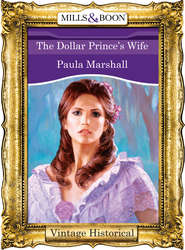По всем вопросам обращайтесь на: info@litportal.ru
(©) 2003-2024.
✖
The Wolfe's Mate
Автор
Год написания книги
2018
Настройки чтения
Размер шрифта
Высота строк
Поля
Her height was neither short nor tall, but somewhere in between. Her carriage had often been called graceful. Susanna, however, knew full well that she was not a raving beauty in the fashionable style which her two half-sisters promised to be. Both of them were blonde, blue-eyed and slightly plump: ‘my two cherubs,’ her stepfather called them.
Nor was her fortune remarkable. Like herself, it might be described as comfortable, her father having died suddenly before he had been able to make it greater. Her stepfather, having daughters of his own to care for—and still hoping for a son—had not considered it his duty to enlarge it.
She straightened herself and held her head as high as she could. There was no use in repining. What was done, was done.
‘I am going to my room,’ she said. ‘Send Mary to me, Mother. I wish to change out of these clothes. They have become hateful to me.’
Even as she spoke, she saw by the expressions on her mother’s and stepfather’s faces that she had become hateful to them: a symbol of their disappointment. Not only had they lost an aristocratic son-in-law, but they were saddled with a daughter who had become unmarriageable.
As her mother said mournfully as soon as she was out of the room, ‘No one will marry her now, Mr Mitchell. Whatever is to become of her?’
He shrugged his shoulders. ‘Do not distress yourself further, my dear. Leave everything to me. I shall make suitable arrangements for her. We cannot have Charlotte and Caroline’s reputations muddied by her continued presence. I have great plans for them, as you know.’
His busy, cunning brain had been working out how to deal with this contretemps ever since he had read Francis Sylvester’s letter.
‘Now follow Miss Beverly’s example, my dear, and change out of your unsuitable bridal finery. Let us put this behind us. I shall speak to her in the morning.’
His tone was so firm that his wife immediately ceased her repining. Although he was usually indulgent towards her and all her three daughters, he invariably spoke to them as though they were recalcitrant clerks when he wished to make it plain that they must obey him immediately.
It was thus he addressed Susanna on the following morning when she arrived in his study in response to his request made over breakfast.
‘It is necessary, Miss Beverly, that we discuss your unfortunate situation immediately. It brooks of no delay. I shall expect to see you in my room at eleven of the clock precisely.’
He had never called her Miss Beverly before. Indeed, in the past few months his manner to her had been particularly affectionate, but there was nothing left of that when he spoke to her then, or later on, when she arrived to find him seated at his desk writing furiously.
Nor did he stand up when she entered, nor cease to write, until he flung his pen down and said, ‘This is a sad business, my dear. I was depending on this marriage to see you settled. I was prepared to find the money for your dowry, seeing that the match was such a splendid one, but, alas, now that your reputation has gone and you are unlikely to marry, such charity on my part is out of the question.’
Susanna listened to him in some bewilderment. She had always been under the impression that her father had left a large sum of money in a Trust for her which should have made it unnecessary for her stepfather to extend her any charity at all in the matter of a dowry.
And so she told him.
He smiled pityingly at her. ‘Dear child, that was a kind fib I told you and your mother. Your father left little—he made many unfortunate investments before his untimely death. The Trust was consequently worthless. I was willing to keep you and even give you the dowry your father would have left you when I hoped that you would make a good marriage—as you so nearly did.
‘But, alas, now that your reputation is blown—through no fault of yours, I freely allow—there is no point in me continuing this useful fiction. I have the unhappy task of informing you that, whilst I will assist you towards establishing yourself in a new life, I cannot afford to continue to provide you with either a large income or a dowry.’
Susanna was not to know that there was not a word of truth in what her stepfather was saying. It was he who had made the unfortunate investments, not her father. He had been stealing from the Trust to help to keep himself afloat ever since he had married Susanna’s mother and he now saw a splendid opportunity to annex the whole of it to himself.
His wife would suspect nothing, for her way of life would continue unchanged: Susanna would be the only sufferer.
‘I shall,’ he continued, ‘settle a small annual income on you, for I would not have my wife’s daughter left in penury. Indeed, no. What I have also done is write a letter to an elderly friend of mine, a Miss Stanton, who lives in Yorkshire. She has asked me to find her a companion and I shall have no hesitation in recommending you to her. She will give you a comfortable home in exchange for a few, easily performed, duties. You may even be fortunate enough to meet someone who, not knowing of your sad history, will offer for you.’
He smiled at her, saying in the kindest voice he could assume, ‘You see, my dear, I continue to have your best interests at heart.’
Susanna sat in stunned silence, her heart beating rapidly. ‘I had no notion,’ she began. ‘Had I been aware of my true position, I would have thanked you before now—as it is…’
Samuel Mitchell raised a proprietorial—and hypocritical—finger. ‘Think nothing of it, my dear. I was but doing my duty. I shall send off the letter immediately, but have no fear, I am sure that Miss Stanton will be only too happy to employ you. Until then, continue to enjoy your position in my home as one of my daughters.’
Susanna nodded her head numbly. She felt deprived of the power of speech. The day before yesterday, she had been the only child and heiress of a reasonably rich merchant of good family. Yesterday, she had been about to become Lady Sylvester. Today, she had been informed that she was a poverty-stricken orphan who was to be sent away to be an elderly lady’s companion—with all that that entailed. Running errands, walking the pug: someone who was neither a servant nor a gentlewoman, but something in-between.
Later, alone in her room, she began to question a little what her stepfather had just told her. Was it really true that her father had left her nothing? That the Trust had been false, nothing but a lying fiction? That she had been living for the past twelve years on her stepfather’s charity? Surely she and her mother would have been informed of that if such had been the case.
She made up her mind to visit the family solicitors to discover the truth. She would not tell Mr Mitchell of her intentions, merely say that she needed to take the air in the family carriage.
But her stepfather, knowing her strong and determined character, so like her late father’s, had foreseen that she might wish to do such a thing, and was able to prevent it by informing her mother that, until it was time for Susanna to travel to Yorkshire, it would be unwise for her to go out in public.
‘The female mind is so delicate,’ he said, ‘that it might, in such a situation as Susanna finds herself in, be inadvisable for her to venture out of doors. A brief period at home, before she makes the long journey to Yorkshire, will do her a power of good.’
‘If you say so,’ her mother said falteringly.
‘Oh, I do say so, Mrs Mitchell. After all, like you, I have her best interests at heart!’
It had been her mother who told Susanna of her stepfather’s decision.
Susanna had stared at her, more sure than ever that something was wrong. She had been about to refuse to obey any such ban and even considered telling her mother of her suspicion that Mr Mitchell had been lying about the Trust and her father’s not having left her anything.
Then she looked at her mother with newly opened eyes and knew that she would not believe that her husband was lying, would simply see Susanna as trouble-making and ungrateful towards a man who had graciously taken the place of her father ever since she had married Mr Mitchell.
Not only would Mr Mitchell make doubly sure that she was confined to the house, but she would make an enemy of them both, to no profit to herself. He would simply assert that the misery of being jilted had unhinged her mind—and she had no answer to that. She was helpless and knew it.
Susanna had taken her mother in her arms and kissed her childhood innocence goodbye. She would go to Yorkshire and try to make a new life there, far from the home which was no longer her home, and where she was not wanted.
Somehow, some day, God willing, she would try to repair the ruin which Francis Sylvester had made of her life…
Chapter One
1819
It had been one of Lady Leominster’s most successful balls, she afterwards boasted to her lord the next morning, who merely grunted and continued to read the Morning Post. His wife’s conversation was only wallpaper in the background of his busy life. It would never do to let her know how useful her balls and other entertainments were, she would only get above herself and, heaven knew, she was too much above herself as it was without his praise elevating her even further.
‘And even the Wolf, the Nabob himself, came—after refusing everyone else’s invitations, even Emily Exford’s.’
M’lord grunted again. This time in appreciation. He had spent a happy half-hour with Benjamin Wolfe, discussing the current state of England, gaining advice on where he might profitably invest his money as the post-war depression roared on, showing no signs of breaking.
‘Not a bad move, that,’ he conceded grudgingly. ‘The feller seems both knowledgeable and helpful. Invite him to our next dinner.’
‘They say that he is looking for a wife.’
‘Shouldn’t have any difficulty finding one, my dear. With all that money.’
‘True, m’lord, but his birth? What of that? Does anyone know of his family?’
‘Well, I do, for one,’ said Lord Leominster, smiling because for once he knew of a piece of gossip which his wife didn’t. ‘Same family as the General of that name. Poor gentry—went to India and made his pile there, or so he says. Besides, money sweetens everything. It’s its own lineage, you know. Half the peerage goes back to nameless thrusters who received titles and consequence solely because of their newly gained riches—nothing wrong in that.’
Lord Leominster’s distant ancestor had been a pirate with Francis Drake and was the founder of the family’s wealth with loot wrested from Spanish treasure ships.
His wife shrugged and abandoned Ben Wolfe as a topic. ‘They say that Darlington is about to offer for Amelia Western—that should be a meeting of money, and no mistake. He was paying her the most marked attention last night.’
She received no answer. Lord Leominster was not interested in idle gossip for its own sake. Ben Wolfe, now, was different. Such creatures had their uses.











